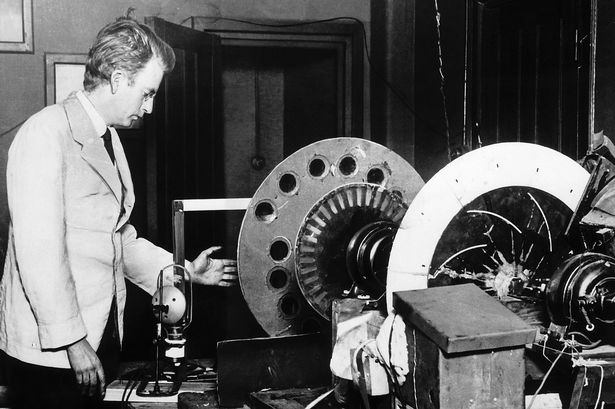Today is World Television Day, going back in time, going back to the late 19th and early 20th centuries to learn more about the historical stories about the first human television.
1. What is television?
Television is a technology in the field of electronics and telecommunications, it includes a collection of electronic devices. Capable of receiving radio waves as well as transmitting electrical signals carrying coded images and sounds, transmitted by radio waves or via optical fiber systems or coaxial cables.
The television serves both audio and visual functions, images are projected on screens and sound is output through the speaker system. Television goes by the English name of Television, but there are other names such as TV, Television or, for short, the word television.
2. Who invented the television?
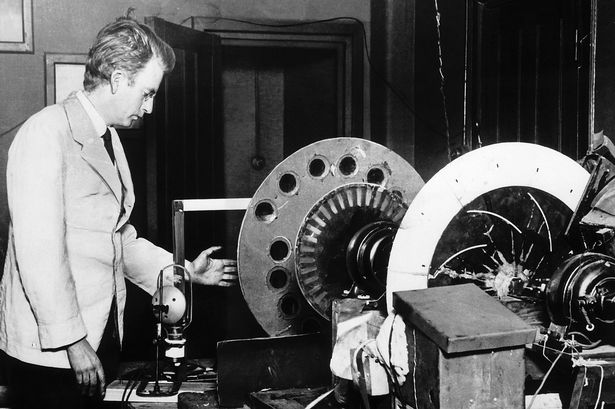 Record History John Logie Baird is the inventor of television. But the story of the creation of the first TV is much more complicated. (Photo: Internet)
Record History John Logie Baird is the inventor of television. But the story of the creation of the first TV is much more complicated. (Photo: Internet)
John Logie Baird is known to the world as the inventor of the first television in 1925. However, the origin of the television is far and complicated than that. History shows that a German student Paul Gottlieb Nipkow was the first to invent the first mechatronic television system in 1885.
Nipkow’s spinning disc design is considered to convert images to points. But it wasn’t until 1907 that the invention of magnifying tube technology made drawings a reality. Around this time, Constatin Perskyi proposed television in a publication at the International Institute of Electronics at the Paris International Fair on August 25, 1900.
Philo Farnsworth, an American (born 1906), produced the first television in 1927. However, his patent was not recognized by the American Radio Association (RCA) and has long been controversial. the newly recognized television rights belong to me.
In 1924, British scientist Bellde successfully transmitted and received images, allowing images to travel long distances, pioneering future satellite televisions. .
In 1926, in London, he publicly carried out this experiment which surprised the whole world. Although the TV he worked on only had two colors in black and white and the picture was very blurry, it opened the door for newer TVs to appear. And Bellde is considered the “ancestor of televisions”.
3. The first color television
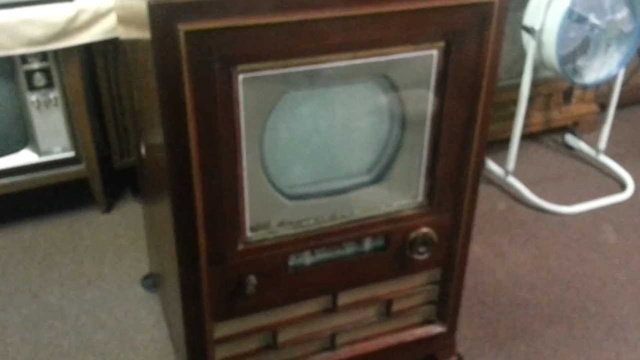 RCA CT-100 was the world’s first color television produced and sold to users in March 1954. At the time of its launch, the CT-100 was priced at $ 1,000, roughly the price of a car. (Photo: Youtube.)
RCA CT-100 was the world’s first color television produced and sold to users in March 1954. At the time of its launch, the CT-100 was priced at $ 1,000, roughly the price of a car. (Photo: Youtube.)
The world’s first color television was invented by John Logie Baird in 1925. John Logie Baird is a Scottish inventor. He was the first to introduce color television technology using electronic bulbs, marking a very important milestone in the history of the development of television technology.
Logie Baird’s first color television demonstration was in 1928. This television could run 30 frames in 5 seconds, then upgraded to 12.5 frames per second and John Logie Baird became the most influential person in the industry. television and television at the moment.
4. The first television show
In 1926, the first television show was broadcast by John Logie Baird. This is a puppet show performed by John Logie Baird himself from a series of cameras and sends an image from a nearby television screen.
In 1928, Baird first broadcast an overseas radio program, from London to New York. This is considered to be the world’s first color television show.
5. In what year was the first commercial television released?
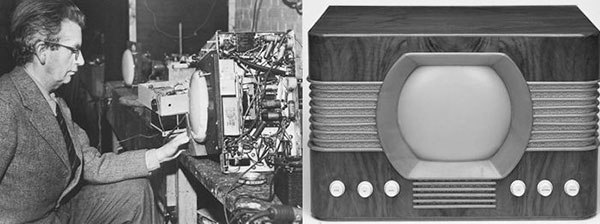
The world’s first commercial television model.
Commercial TV was first introduced in the United States in 1938 as the Dumont Model 180. The television with a screen size of 8 x 10 inches was sold for $ 395 at the time, or nearly $ 7,000 at the time. present.
6. When was the remote control invented?
For now, a television should have a remote control. However, almost 30 years after the release of the first TV, the TV remote control was invented. In 1955, Eugene Polley and his colleague, Robert Adler, invented the TV remote control.
When it was first released, this device called “Flash-Matic” made it possible to interact with the television thanks to the photoelectric effect. It gradually replaced the popular cable control devices at that time. In 1997, Polley and Adler’s remote invention received the American Academy of Television Emmy Award.
7. The first professional television show
On November 2, 1936, from Alexandra Palace Victoria in North London, the BBC broadcast the first professional television, marking the start of world television. According to the data available, at that time only around 500 televisions could receive the broadcast of this program.
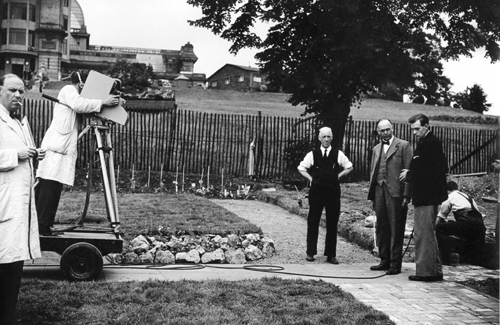
On November 2, 1936, the BBC broadcast the first television show from Alexandra Palace Victoria. (Photo: BBC.)
At that time, the BBC was using two systems to transmit the signals, the Baird 240 lines and the Marconi-EMI 405 lines. However, after 6 weeks of alternate testing, the Baird system revealed its shortcomings. It was too bulky and the effects were inferior to Marconi-EMI. As a result, Baird was scrapped in early 1937.
In November 1937, the BBC made its first notable outdoor program. It was the coronation broadcast of King George VI in Hyde Park, London. The BBC used a portable transmitter mounted on a special vehicle. Thousands of spectators attended this show.
8. How many televisions have been sold in the world
So far, it is impossible to know how many televisions have been sold around the world. However, according to statistics, in 2013, 79% of households in the world had at least 1 TV.
9. The attitudes of people who watch television for the first time
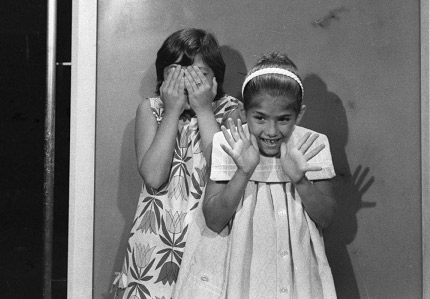 Reaction of those who watched television first. (Drawing)
Reaction of those who watched television first. (Drawing)
When it came out, television was a magical world for viewers at that time. For the first time when color television was introduced at the 1964 World’s Fair in New York (USA).
In order for customers to experience the interesting and superior points of color television over black and white television, the owner of a color television booth invited customers to record and broadcast live video “in game” . And we captured the emotional moments of those who watched color television for the first time, of surprise, delight in shock, panic and boo.
The reaction of the visitors to the screen was very interesting, the owner of the booth then recorded these precious moments, at that time color television was still a new and incredible invention. surprised.
10. The historic moment of world television
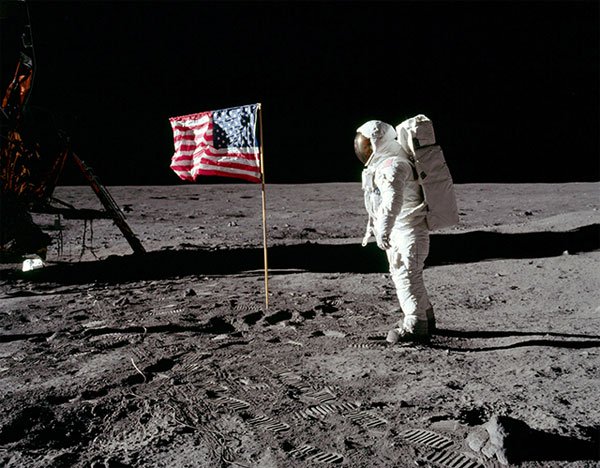 Television recorded the events of January 20, 1969, when American astronaut Neil Armstrong and the Apollo 11 spacecraft took their first steps on the moon.
Television recorded the events of January 20, 1969, when American astronaut Neil Armstrong and the Apollo 11 spacecraft took their first steps on the moon.
In the 60s of the twentieth century, television became an important means of entertainment in human life, this technology brought people interesting experiences in the spiritual life.
And television recorded its golden mark at an event in the big world, this is the event of January 20, 1969 when American astronaut Neil Armstrong and the Apollo 11 spacecraft placed the first step on the moon, this historic moment entered the hearts of millions of people across America and the world thanks to the television system.
Memorable TV milestones
1885: Paul Gottlied Nipkow, a German student, creates the first mechatronic television system, which involves rotating and converting images to dots. But this design only really succeeded after the introduction of magnifying tube technology. And at this point, the TV still only stops displaying still images.
1911: Two Russian scientists Boris Rosing and his student Vladimir Kosma Zwongrykin successfully built a television using a mirror to broadcast, the work was still unfinished when Boris Rosing was captured by Stalin and died. 2 years later.
1920: American scientists Charles Francis Jenkins and John Logie Baird create the first complete television model of humanity.
1927: A young American scientist named Philo Taylor Farnsworth developed the cathode ray tube, an important invention in the generation of electronic signals. This invention is considered to be a major advance in human television technology.
1930: Considered the year of the start of the television era with the appearance of commercial televisions such as EMI-Marconi and Baird with two signal systems of 240 scan lines and 405 scan lines.


